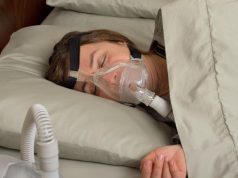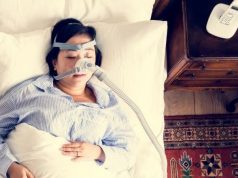Low levels of female sex hormones linked to sleep apnea symptoms in study of 774 women aged 40 to 67 years
WEDNESDAY, June 22, 2022 (HealthDay News) — Middle-aged women with low serum estrogen and progesterone levels are more likely to snore and report symptoms of obstructive sleep apnea, according to a study published online June 22 in PLOS ONE.
Erla S. Sigurðardóttir, from the University of Iceland in ReykjavÃk, and colleagues assessed whether serum concentration of estrogens and progesterone are associated with the prevalence of sleep apnea symptoms in middle-aged women. The analysis included 774 women (aged 40 to 67 years) from seven European countries.
The researchers found that a doubling of serum concentrations of estrone and progesterone was associated with decreased odds of snoring (19 and 9 percent, respectively). A doubling of the concentrations of 17β-estradiol, estrone, and estrone 3-sulfate was associated with 18, 23, and 17 percent decreased odds, respectively, of breathing irregularly among snorers, while a doubling of the progesterone concentration was further associated with 12 percent decreased odds of waking up suddenly with a choking sensation.
“It is crucial to develop strategies to decrease the high prevalence and associated morbidity of obstructive sleep apnea and adjusting female sex hormones levels might be the key to accomplish this,” the authors write.
Copyright © 2022 HealthDay. All rights reserved.








